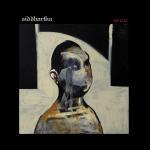
Siddhartha If It Die
(Neurotic Yell Records)
What must be said in the first instance is that this is rock music. Dashiki Shoegaze is the genre defying description that has been conjured from their voodoo spirit, and, I mean, it is correct. The distinction between instruments and vocals can be a seductive litany of amalgamation, absolutely it can, and magnificently so. The vocal, despite its doubtless virility, more commonly accompanies rather than leads – as do many of the instrumental aspects as well. What is more accurate, however, and richly imbedded in the marrow of the record is a poly-phrenic mind-fuck of cabin fever which never relents its grip on unreality.
The majority of the record was recorded in San Francisco, in the windowless home of band leader; multi-instrumentalist (Guitar, Bass, African Xylophone, Djembe – Hand Drum) and vocalist Marlon Hauser. If It Die possesses tempting alcoves of mania, in which the bass grooves and the guitars riff into oblivion amongst the other shoegaze aspects of fiddling chemistry and sobering, majestic insanity. He describes the ‘living space’ as being ‘akin to living in a sensory deprivation tank,’ and it becomes abundantly stark that this dynamic will emanate throughout the sound.
In terms of the vocal, again, what you encounter are embracing melodies that aren’t individually paramount but are cohesive and human in cahoots with the plethora of rhythm behind. Truly, at times, the bass finds existential beauty among the under-weeds of swamp-like disfigurement and it always coincides with the often brutal drums to eruptive effect. In fact, the most relevant way to consume this record would be to try and meditate blindfolded whilst being electrocuted every thirty seconds or so through the ass! There are profound moments of grace, for sure, but just how long you can relax into those moments is vastly disconcerting. The band have set their barometer to ‘all encompassing, transformative’ music, or rather, the experience of listening to the music is such, and I think that is quite true. The dissections of interest arrive unknowingly and dissipate just as illusively, all expunged from the harrowed mind of Hauser along every millimetre of the sonic spectrum that he can conceive.
What I have concluded is that man needs windows. This may sound like a derogatory statement in retrospect but it isn’t. When he doesn’t have a physical vista to engorge his senses, he will resort to windows of his mind – and in the case of Hauser, it is a fucked up and subjective place full of melted paintings dripping with semen. Weird, disconcerting and apocalyptically pleasurable, but isn’t that a great thing? If the music can become something greater than just a pocket of sound then shouldn’t that be celebrated? He confronts the disgraceful and embraces the unpalatable in a bold and personal statement of individuality. If It Die exists within some parallel cornucopia, convulsing at its own creation; a metamorphic surmising of what it means to live in this world. Somewhere majestic and beneath recognition, entwined with indistinct layers of savagery and compassion there are caressing whispers of humanity and the effervescent voice of Marlon Hauser: “If It Die, Then Give It Life.”
17 April, 2012 - 12:34 — Matt Bevington